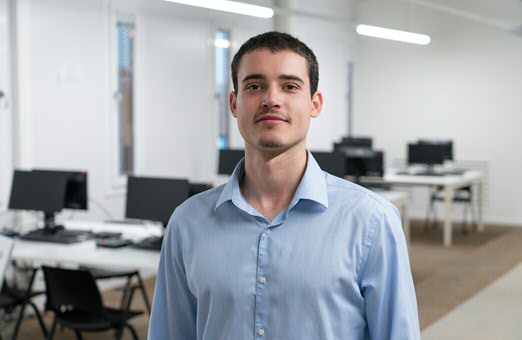
Study international financial management in Groningen and get uniquely equipped to have a career in finance and be a part of the management team in multinational companies and financial institutions.
Do you want to study the international aspects of corporate finance, management and financial accounting to become an expert in solving complex financial challenges in the global business world? Can you see yourself making decisions, using the latest finance and risk management tools and techniques for managing international financial activities? With a Master’s degree in International Financial Management (IFM), you can join the global workforce that contributes to financial decision-making in public, private, and government organizations in an ethical and sustainable manner.
The MSc IFM imparts advanced academic knowledge, understanding and skills required to define, analyze and evaluate real and complex international financial management problems on both the level of companies and institutions, as well as on a societal level. You gain knowledge from a wide range of study fields such as finance, accounting, control, and management under ethical, sustainable and responsible principles. This programme will teach you to think strategically, explore new ideas, apply research methods and address complex financial problems and opportunities in multinational companies and international financial institutions and organizations. Additionally, our master programme brings together students with diverse backgrounds. We value each student's unique perspective and encourage open discussions in our classes.
If you are ambitious and want to challenge yourself, you can earn two Master's degrees by studying International Financial Management in Groningen in your first year and Banking and Finance in Milan, Italy, in your second year. Read more about this Double Degree option with the Università Cattolica del Sacro Cuore in Milan.
During the one-year programme, you gain advanced knowledge in several specific fields in international financial management, such as international risk management, including exchange rate and political risks, international financing opportunities, as well as corporate governance and social responsibility. Courses like international management accounting and control, and international financial reporting examine accounting and control aspects of international business and the international economic environment in which multinational companies operate.
To specialize in an area of your interest, we give you the
opportunity to choose from a wide variety of elective courses in
topics such as trade, environment and growth, inclusive finance,
sustainability in business and economics, energy transition, and
many more (check the Ocasys course catalog for the full
list).
You will learn to collect and analyze data, plan and
design a research project, and undertake academic writing. You will
also build business models, present in public, and work in diverse
teams. The academic and professional skills you will develop are
highly sought after and will give you access to exciting job
opportunities. You will wrap up the programme by writing and
presenting a master thesis.
Do you want to know the difference between MSc International
Financial Management and MSc Finance? Find
out more about this.
| Semesters | ||||
|---|---|---|---|---|
| CoursesCourse Catalog > | 1a | 1b | 2a | 2b |
| Empirical Methods (5 EC) | ||||
| Financial Management for Multinationals (5 EC) | ||||
| Elective courses (20 EC) A few examples are: International Management Accounting & Control; International Financial Reporting; Country Studies; Sustainability in Business and Economics; Sustainable Finance; Financing the Energy Transition; Comparative Corporate Governance; International Finance and Development; Business Research and Consulting; Value-based Management. The full list of electives can be found on Ocasys. | ||||
| International Financial Institutions and Governance (5 EC) | ||||
| Research Seminar (5 EC) | ||||
| Master's Thesis (20 EC) | ||||
| Programme options |
|---|
| Double Degree Master International Financial Management (Milan) (specialization) Are you interested in a career in financial markets, international finance and risk management? The Faculty of Economics and Business (University of Groningen) and Università Cattolica del Sacro Cuore (UCSC Milan) have joined forces to set up a high-quality, two-year double degree master in the fields of banking, risk and financial management, and international finance. |
| Double Degree Master International Business and Finance (Shanghai) (specialization) Are you interested in an international career in or involving China? Study in Shanghai after your FEB Master's programme in Groningen and gain first-hand knowledge and experience of China and the economy, finance and culture. |
| Healthy Society Focus Area (specialization) Focus on tackling problems that impact healthcare providers and their societal partners in their day-to-day work. Issues such as scarce human resources combined with a higher, more complex demand for care, and more demanding citizens require solutions, which you will think about and design. |
| Leadership and Governance (specialization) The Leadership and Governance focus area provides you with a deep understanding of both macro-level governance frameworks and micro-level leadership processes. This dual approach enables you to understand the broader implications of governance and leadership, while also recognizing the conditions that shape behavior, decision-making and organizational dynamics. |
| Finance and Development Focus Area (specialization) Focus on the blended realms of Finance and Development. Explore the dynamic relationship between empowering individuals as micro-entrepreneurs and fostering sustainable growth and engage in the ongoing discussion about the role of financial development in enhancing growth and reducing poverty. Your skills and knowledge will prepare you to contribute to the debates on these topics and to work at national and/or multilateral development banks. |
| Future Prosperity and Sustainability Focus Area (specialization) Focus on the sustainable developments in our current society by the increasing influence of the Sustainable Development Goals (SDGs) of the United Nations. The upcoming impact of the SDGs force companies to redefine their purpose and seek a path for meaningful contribution. But, what are companies responsible for, and who bears the burden of the consequences? Your skills and knowledge will prepare you to actively contribute to the strategic developments in this dynamic field. |
| Energy Transition and Climate Change Focus Area (specialization) Focus on the serious changes within the energy sector by dealing with issues such as how firms adapt to renewable energy, how the higher taxes are managed during this transition and how to deal with the weather dependent production of energy systems. Gain the knowledge and skills to shape a sustainable future in this evolving energy sector. |
| Master Internship (specialization) Opportunity to gain work experience by doing an internship in the second semester of your study. You will be rewarded 15 ECTS on top of your programme. Your thesis will be postponed to the third semester. |
The second year of the two-year DDM programme, you will study at the USCS in Milan.
| Specific requirements | More information |
|---|---|
| previous education |
Below you will see a table with 'transfer options'. Please check the entry requirements for your Bachelor's degree (from a research university of a university of applied sciences). If your degree is not mentioned in the table below, you can still apply via a Pre-Master's programme. For information on application and entry requirements, please check https://www.rug.nl/feb/premaster. The information about entry requirements is an indication of your admissibility. Every application will be reviewed individually by the Admissions Board so the admission decision may differ from the indication in this table. |
| Study programme | Organization | Transition |
|---|---|---|
| Business Administration | Erasmus University Rotterdam | No additional requirements |
| Economics and Business Economics | Erasmus University Rotterdam | No additional requirements |
| Econometrics and Operations Research | Erasmus University Rotterdam | No additional requirements |
| Fiscale Economie | Erasmus University Rotterdam |
Via a pre-master with a maximum of Via a Pre-Master's with a maximum of 30 EC. More information: https://www.rug.nl/feb/education/study-programmes/pre-msc/ |
| International Business Administration | Erasmus University Rotterdam | No additional requirements |
| Study programme | Organization | Transition |
|---|---|---|
| Public Administration Science | Leiden University |
Via a pre-master More information:Via a Pre-Master's with a maximum of 30 EC for profile Economics, Public Administration and Management. Other profiles via a Pre-Master's of 45 EC. More information: https://www.rug.nl/feb/education/study-programmes/pre-msc/ |
| Computer Science | Leiden University |
No additional requirements More information:For profile Informatica & Economie. |
| Study programme | Organization | Transition |
|---|---|---|
| Economics and Governance | Wageningen University |
Via a pre-master More information:Via a Pre-Master's with a maximum of 30 EC. More information: https://www.rug.nl/feb/education/study-programmes/pre-msc/ |
| Management and Consumer Studies | Wageningen University |
Via a pre-master More information:Via a Pre-Master's with a maximum of 30 EC. More information: https://www.rug.nl/feb/education/study-programmes/pre-msc/ |
| Study programme | Organization | Transition |
|---|---|---|
| Fiscale Economie | Maastricht University |
Via a pre-master with a maximum of Via a Pre-Master's with a maximum of 30 EC. More information: https://www.rug.nl/feb/education/study-programmes/pre-msc/ |
| International Business | Maastricht University | No additional requirements |
| Business Engineering | Maastricht University | No additional requirements |
| Economics and Business Economics | Maastricht University | No additional requirements |
| Econometrics and Operations Research | Maastricht University | No additional requirements |
| Business Analytics | Maastricht University | No additional requirements |
| Global Studies | Maastricht University | No additional requirements |
| Study programme | Organization | Transition |
|---|---|---|
| Fiscale Economie | University of Amsterdam |
Via a pre-master with a maximum of Via a Pre-Master's with a maximum of 30 EC. More information: https://www.rug.nl/feb/education/study-programmes/pre-msc/ |
| Business Analytics | University of Amsterdam | No additional requirements |
| Business Administration | University of Amsterdam | No additional requirements |
| Actuarial Science | University of Amsterdam | No additional requirements |
| Economics and Business Economics | University of Amsterdam | No additional requirements |
| Econometrics and Data Science | University of Amsterdam | No additional requirements |
| Study programme | Organization | Transition |
|---|---|---|
| Fiscale Economie | Tilburg University |
Via a pre-master with a maximum of Via a Pre-Master's with a maximum of 30 EC. More information: https://www.rug.nl/feb/education/study-programmes/pre-msc/ |
| International Business Administration | Tilburg University | No additional requirements |
| Economics | Tilburg University | No additional requirements |
| Econometrics and Operations Research | Tilburg University | No additional requirements |
| Entrepreneurship and Business Innovation | Tilburg University | No additional requirements |
| Study programme | Organization | Transition |
|---|---|---|
| Business Analytics | VU University Amsterdam |
Via a pre-master More information:Via a Pre-Master's with a maximum of 30 EC. More information: https://www.rug.nl/feb/education/study-programmes/pre-msc/ |
| Business Administration | VU University Amsterdam | No additional requirements |
| Economics and Business Economics | VU University Amsterdam | No additional requirements |
| International Business Administration | VU University Amsterdam | No additional requirements |
| Econometrics and Operations Research | VU University Amsterdam | No additional requirements |
| Study programme | Organization | Transition |
|---|---|---|
| Sociology | University of Groningen |
Via a pre-master with a maximum of You need to first complete the 45 EC (or less) Pre-Master's programme. For information about the Pre-MSc application and entry requirements, please check https://www.rug.nl/feb/premaster. |
| Industrial Engineering and Management | University of Groningen |
Additional requirements More information:For students with completed courses: Financial Accounting and International Financial Management. |
| International Business | University of Groningen | No additional requirements |
| Econometrics and Operations Research | University of Groningen | No additional requirements |
| Psychology (NL) | University of Groningen |
Via a pre-master with a maximum of You need to first complete the 45 EC (or less) Pre-Master's programme. For information about the Pre-MSc application and entry requirements, please check https://www.rug.nl/feb/premaster. |
| Business Administration | University of Groningen | No additional requirements |
| Economics and Business Economics | University of Groningen | No additional requirements |
| Study programme | Organization | Transition |
|---|---|---|
| Business Administration | Nyenrode New Business School | No additional requirements |
| Accountancy | Nyenrode New Business School | No additional requirements |
| Study programme | Organization | Transition |
|---|---|---|
| Economics and Business Economics | Utrecht University | No additional requirements |
| Study programme | Organization | Transition |
|---|---|---|
| International Business Administration | University of Twente | No additional requirements |
| Study programme | Organization | Transition |
|---|---|---|
| Business Administration | Radboud University Nijmegen | No additional requirements |
| Economics and Business Economics | Radboud University Nijmegen | No additional requirements |
Students with a Dutch diploma can apply directly to Studielink. More information on the steps to apply .
| Type of student | Deadline | Start course |
|---|---|---|
| Dutch students | 15 October 2025 | 01 February 2026 |
| 01 May 2026 | 01 September 2026 | |
| 15 October 2026 | 01 February 2027 | |
| EU/EEA students | 15 October 2025 | 01 February 2026 |
| 01 May 2026 | 01 September 2026 | |
| 15 October 2026 | 01 February 2027 | |
| non-EU/EEA students | 15 October 2025 | 01 February 2026 |
| 01 May 2026 | 01 September 2026 | |
| 15 October 2026 | 01 February 2027 |
| Specific requirements | More information |
|---|---|
| previous education |
To be eligible for admission to this Master, you need to hold an academic Bachelor's or Master's degree from a research university in one of the following - or closely related - fields: Business Economics, Business Administration, Economics and Business Economics, International Business, Technology Management. To assess whether your educational/academic background meets the specific programme requirements, we will consider the level and curriculum of your previous studies. For more information, please visit: https://www.rug.nl/feb/apply-msc. If you have any questions concerning admission to this programme, please contact our Admissions Office: https://www.rug.nl/admissions. |
| language test |
IELTS Academic overall score 6.5 (Speaking 6, Writing 6.5); TOEFL internet-based overall score 90 (Speaking 20, Writing 24); Cambridge C1 Advanced or C2 Proficiency (overall score 176, Speaking 169, Writing 176).
|
| other admission requirements |
Not meeting the pre-education requirements for direct entry? Please read more about our pre-Master programmes . |
Students have to apply via Studielink and the Progress Portal (replacing the previous system, Online Application System OAS) of the University of Groningen. After you apply for the programme of your choice, the Admissions Office will evaluate your educational background and assess your eligibility. Your application will be assessed on an individual basis. More information on how to apply.
| Type of student | Deadline | Start course |
|---|---|---|
| Dutch students | 15 October 2025 | 01 February 2026 |
| 01 May 2026 | 01 September 2026 | |
| 15 October 2026 | 01 February 2027 | |
| EU/EEA students | 15 October 2025 | 01 February 2026 |
| 01 May 2026 | 01 September 2026 | |
| 15 October 2026 | 01 February 2027 | |
| non-EU/EEA students | 15 October 2025 | 01 February 2026 |
| 01 May 2026 | 01 September 2026 | |
| 15 October 2026 | 01 February 2027 |
The knowledge of academic theory and practical tools that you will have acquired are highly valued in the labour market and your specialized expertise will contribute enormously to your employability. You will be able to take up positions in which you contribute as a specialist in international financial management, decision-making in multinational companies and financial institutions. You will also be in demand among consultancy firms, and international financial institutions (e.g., Regional Development Banks), as well as the European Central Bank (ECB), and other governmental institutions.
Our research-driven education is strongly rooted in business practice and society. At the heart of our teaching approach is (interdisciplinary) research. In collaboration with external partners, students and professors conduct projects on societally relevant topics such as healthy society and the economics of healthcare systems, digitalization and how AI is shaping business and societies, leadership and governance, future prosperity and sustainability, climate change and how to tackle the shift to renewable energy. From day one of your degree, the focus is on making a real impact.

The MSc International Financial Management caught my attention because it covers not only corporate finance but also includes risk management, financial accounting, and analytical and quantitative skills. It blends finance with management, instilling analytical thinking. It's more than just numbers; it's about analyzing and planning the next steps. The programme also provides a global perspective on the financial market. Upon completing the programme, I aspire to work in the banking industry, and IFM prepares me thoroughly for this field. All courses offer essential aspects for my future career. Beyond practical and technical knowledge, MSc IFM enhances my critical, creative, and problem-solving thinking, focusing on solutions.

The MSc International Financial Management captivates me with its diverse curriculum, problem-solving focus, and international market orientation. It equips students with analytical skills for addressing global challenges in multinational corporations, a valuable asset for international firms. My participation in the Sustainable Society Focus Area, delving into contemporary developments and corporate-society dynamics, aligns with the growing emphasis on ethics and sustainability, enhancing my future career prospects. I firmly believe that my acquired knowledge in transaction evaluation, financial analysis, stakeholder considerations, and ESG/CSR practices is exceptionally valuable in today's business landscape.

I chose to study this Master’s programme, because one of the unique features is the opportunity to do a Double Degree programme, allowing you to study in both Groningen and Milan. What I value most about the MSc International Financial Management are its diverse opportunities. The programme's flexibility allows internships, studying in Milan through the DDM programme, and a valuable job market preparation, including a Career Week, where you engage with potential employers. Furthermore, guest lectures, real-life cases, and in-class projects enhance practical career understanding. Additionally, the mandatory courses greatly emphasize sustainability and digital business, fostering awareness and practical application. I believe the knowledge gained in this programme will be a solid foundation for effectively adapting to real-world work situations.
Last but not least, Groningen is a beautiful historic city with a large student community and is also relatively affordable compared to other Dutch cities.

Find out more about the difference between the MSc International Financial Management and MSc Finance.